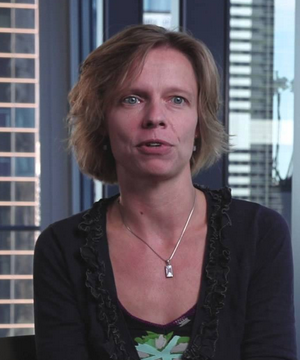Esther Nolte-‘t Hoen,
Assistant Professor, Department of Biochemistry & Cell Biology, Faculty of Veterinary Medicine,
Utrecht University
Dr. Esther Nolte-‘t Hoen did her PhD (2003) on regulation of T cell responses in the lab of Professor Wauben at Utrecht University, The Netherlands. At this early stage, she discovered that T cells can modulate the function of antigen presenting cells by transferring proteins via small extracellular vesicles. As a post-doctoral fellow in Prof. Daniel Davis’ laboratory at Imperial College London, Nolte-‘t Hoen further explored the cell biology of immune cell interactions using state-of-the-art microscopical techniques. After a second post-doc at Utrecht University, she was appointed Assistant Professor in 2013. Her research focuses on the role of extracellular vesicles in communication between immune cells at steady state and during microbial infection. Within this topic, she puts strong focus on technical aspects of extracellular vesicle purification, methods for high-throughput individual vesicle analysis, the RNA content of extracellular vesicles, and the interplay between vesicles and viruses. Nolte-‘t Hoen was awarded a European Research Council Starting Grant (1500 k€) in 2013 to explore parallel mechanisms underlying the formation of viruses and extracellular vesicles. Nolte-‘t Hoen is an active member of the International Society of Extracellular Vesicles and in 2015 organized an international research seminar for this society on how the function of extracellular vesicle-associated RNA can be unraveled.
|

|
|

 Add to Calendar ▼2018-10-25 10:30:002018-10-25 11:30:00Europe/LondonInterpreting Extracellular Vesicles as Snapshots of CellsExosomes and Liquid Biopsies Europe 2018 in Rotterdam, The NetherlandsRotterdam, The NetherlandsSELECTBIOenquiries@selectbiosciences.com
Add to Calendar ▼2018-10-25 10:30:002018-10-25 11:30:00Europe/LondonInterpreting Extracellular Vesicles as Snapshots of CellsExosomes and Liquid Biopsies Europe 2018 in Rotterdam, The NetherlandsRotterdam, The NetherlandsSELECTBIOenquiries@selectbiosciences.com Add to Calendar ▼2018-10-24 00:00:002018-10-26 00:00:00Europe/LondonExosomes and Liquid Biopsies Europe 2018Exosomes and Liquid Biopsies Europe 2018 in Rotterdam, The NetherlandsRotterdam, The NetherlandsSELECTBIOenquiries@selectbiosciences.com
Add to Calendar ▼2018-10-24 00:00:002018-10-26 00:00:00Europe/LondonExosomes and Liquid Biopsies Europe 2018Exosomes and Liquid Biopsies Europe 2018 in Rotterdam, The NetherlandsRotterdam, The NetherlandsSELECTBIOenquiries@selectbiosciences.com